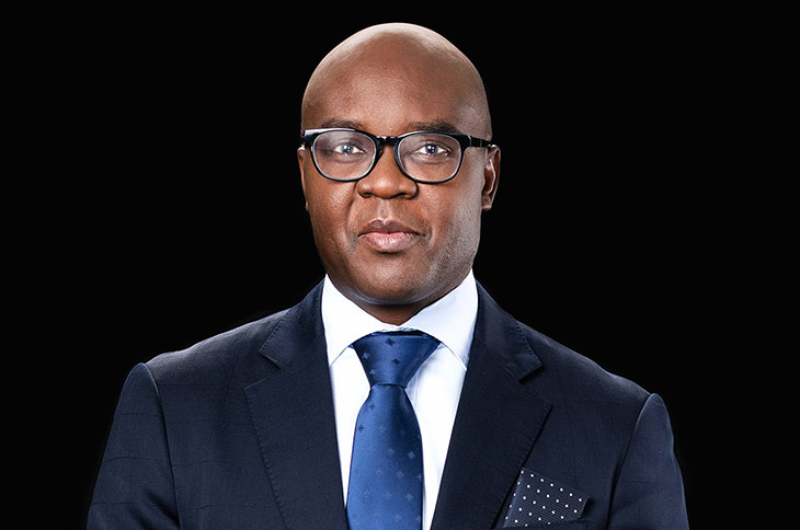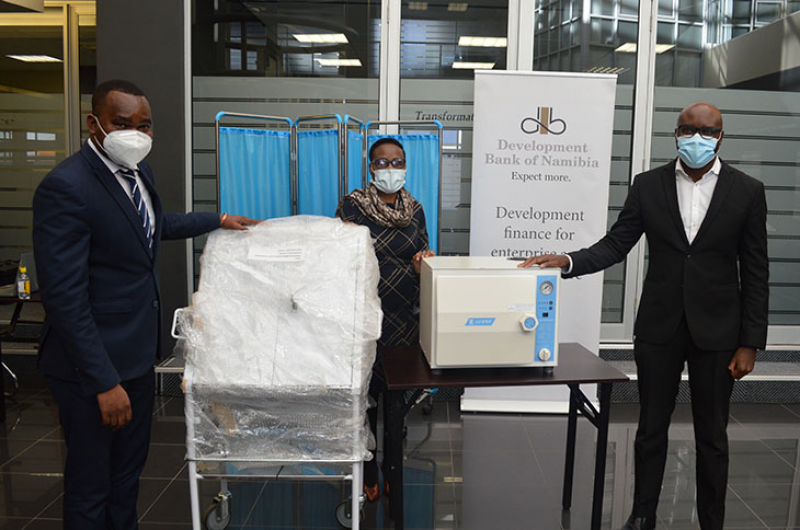 Call 061 290 8000
Call 061 290 8000 Click to mail us
Click to mail us FAQs
FAQs

DBN
The Bank has announced a facility to finance climate change adaptation, bolstering its long track record of finance for beneficial environmental and social initiatives.
Explaining the facility, DBN CEO Martin Inkumbi said it provides an affordable and tailored financing solution for climate and environmentally friendly projects. The Bank has previously financed low-carbon renewable energy generation, water reclamation for industrial use in Walvis Bay, water storage in Neckartal Dam and reclamation initiatives.
Inkumbi said that finance for climate adaptation is important, and there is a range of affordable financing instruments for such business projects.
The Bank, he said, has already pioneered financing models for renewable energy, and is now setting its sights on, energy and water use efficiency as well as mitigating the effects of rising temperatures.
On the topic of water, Inkumbi said that the Bank has been financed large scale water infrastructure such as Neckartal Dam and Aqua Utilities which semi-purifies water for industrial use at Walvis Bay. However, he said that in the face of prolonged droughts, there is an opportunity for enterprises to invest in water efficiency. Investing in technology and processes that are energy and water efficient reduces the amount of energy and water consumption per output for a business, which lowers production and or operational costs and improve profitability.
Although water efficiency will not alleviate drought, it can lead to improvements in enterprises bottom lines, in addition to preserving the environment.
Inkumbi urged enterprises to examine their energy and water usage and costs, and develop innovative methods to reduce their water usage and associated costs.
He added that the Bank has experience in water reticulation for local authorities and PPPs but said there was still scope for further development in terms of water recycling, reclamation and storage in abattoirs.
On the topic of rising temperatures, Inkumbi noted that there is a twofold cost. The first cost is the cost of cooling facilities, and the second cost is the cost of mitigating health issues caused by rising heat. The cost of cooling facilities adds to the cost of an enterprise. It also places a burden on power generation. By constructing plants and facilities with heat dissipation in mind, these circumstances can be mitigated.
He extended the benefits of energy efficient housing developments, explaining that incorporating heat dissipation would reduce the cost of running a household as well as improve the health of its residents. This, he said would dovetail well with the Bank’s finance for affordable housing projects.
Asked about how the facility would benefit enterprises and initiatives, Inkumbi said that there is an understandable reticence to finance projects with unfamiliar financing outcomes. This was the case when DBN pioneered finance for privately owned renewable energy. The Bank however de-risks innovative projects with extensive due diligence on innovation and absorbs, manages and learns from its risks. In this way, the Bank hopes to pioneer finance for climate change adaptation that will make Namibia more sustainable.
Inkumbi concluded by calling on engineers, architects, consultants and project managers to lean more towards energy and water efficient designs, and for businesses to approach the Bank for finance. Although you may have reservations about pitching new technologies and techniques, the Bank will give them consideration for finance if you can demonstrate their feasibility.
The onset of Covid-19, 18 months ago, has led to vulnerability on the part of some enterprises. Development Bank of Namibia (DBN) CEO Martin Inkumbi suggests that one solution can be found in equity finance through a national equity fund for qualifying enterprises currently experiencing headwinds, but with potential for future growth prospects.
Advancing additional loans to borrowers, even as temporary relief measures, is not always a solution that works for all struggling businesses impacted by Covid-19.
The financial sector has deployed a raft of measures to reduce enterprise vulnerability due to Covid-19. These include, among others, repayment holidays, grace periods, additional finance for operational costs and extension of repayment periods to offset the monthly cost of interest to the enterprise.
These measures are only effective when the depressed economic cycle lasted for a short period of 6 to 12 months. In the case of a protracted depressed economic cycle that we are seeing now, these measures are proving ineffective, if not detrimental to the long term sustainability of enterprises.
A national equity fund would add to the financing toolkit, provided the equity investments or debt to equity conversions are made on pure business and economic merit, and on the potential viability and recovery of an enterprise. This requirement is paramount.
Ideally, this equity finance vehicle, says Inkumbi, should not be taking a permanent shareholding, but should enable the original shareholders to repurchase their shareholding as the enterprise recovers and grows, or to onboard new shareholders depending on the preferences of the existing shareholders.
Inkumbi adds that the arrangement should allow the national equity fund to intervene or recommend managerial and / or operational methods to strengthen governance and improve business growth. However, he says, the ideal will be to allow existing enterprise shareholders the independence to manage their business and turn it around through their own business acumen, learnings and experience.
On the topic of capitalizing an equity fund, Inkumbi says that the requirement will be substantial, and suggests pooling of funds in a national vehicle. If such a National Equity Fund is capitalized with borrowed funds, e.g. private sector bonds issued to capitalize the fund, and repaid by taxpayers over time, this will be in exchange for equity in Namibian companies that will continue to grow in value over time.
The important and imminent benefit of a national equity fund intervention however, is saving Namibian enterprises from collapsing during the current depressed economic cycle, preserving current and future employment and sustaining economic growth.
Inkumbi says over the last 18 months, four broad categories of borrowers are notable in the DBN portfolio.
The first category consists of borrowers who experienced headwinds prior to the onset of Covid-19 due to the economic slowdowns. These borrowers had their challenges compounded by the onset of Covid-19. These challenges included stiff competition, lack of demand, unaligned operating costs and price structures and poor business management. These borrowers have generally been facing a downhill and imminent foreclosure, and it is normal and acceptable that an unviable business will close down. Only Good Business is Good for development.
The second category consists of borrowers who were similarly challenged, but were able to service their debts, albeit remaining persistently in arrears on their repayments.
The third category consists of borrowers who were successful and were able to service their debts, but were challenged by the onset of Covid-19 lockdowns, which hampered business activities and revenues.
The final category consists of those enterprises who benefit from inelastic, constant demand and turnover despite Covid-19. These enterprises typically benefit from contracts and / or tenders.
Inkumbi points to the second and third category of enterprises as being the most likely beneficiaries of a national equity fund.
Inkumbi says that the recovery will not be instant, but that in the medium to long term, Namibia and its enterprises can emerge into a period of growth, provided that their economic capacity is preserved. The medium-term vision of equity finance will, potentially accelerate the outcome.
Although the economic waters are choppy, with all hands on deck, the vessel can make progress with equity finance, Inkumbi concludes.
Development Bank of Namibia has donated N$88,000 worth of medical equipment to Robert Mugabe Clinic. The equipment consists of a sterilizer machine, 8 mobile hospital curtains, 10 oxygen regulators and a medicine trolley. This donation adds to prior Bank donations of N$1,4 million to manage Covid-19.
Speaking at the donation ceremony, Development Bank of Namibia CEO Martin Inkumbi said the Bank is an entity that is committed to Namibia in good times and in times of difficulty, such as the Covid-19 pandemic.
The Bank, he said wants to contribute to saving lives and preserving people’s health. For this reason, DBN decided to support Robert Mugabe Clinic with health equipment and consumables to aid the clinic in assisting those Namibians affected by the virus and seeking healthcare at the clinic.
Inkumbi pointed out that as part of its corporate social investments, the Bank has already donated N$1.4 million to the national effort to manage Covid-19. The donation to Robert Mugabe Clinic is a further effort to manage the pandemic.
Thanking the Bank for the donation, Khomas Regional Director Tomas Ukola said the medical equipment will be essential tools in health worker's COVID-19 toolbox to save more lives and provide quality healthcare, which is the pinnacle of any healthcare system.
Talking about the impact of the donation on Robert Mugabe Clinic’s operations, Sister Justina Hamunyela said that like all other Covid-19 facilities in the country, the clinic has been experiencing numerous challenges that include inadequate oxygen regulators and floor meters, oxygen supply and other medical equipment.
She said the donation by the Development Bank of Namibia came at opportune time when the clinic is overwhelmed by numerous patients experiencing signs and symptoms consistent with Covid-19 and higher demand for oxygen in the face of the threats of hospitalization and death.
The donation, Sister Hamunyela said, will go along way in facilitating timely treatment of patients, improving staff morale, enhancing productivity and efficient service by the clinic's frontline health care providers.





